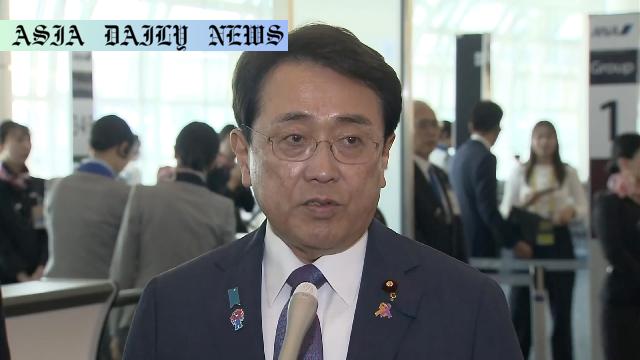Tariff: Japan’s chief negotiator aims to address rising tensions before August 1 US import tariffs are enforced.
Japan’s top negotiator plans to visit Washington for critical trade talks before US tariffs are imposed.
Economic Revitalization Minister aims to protect Japanese economic interests amidst rising trade tensions.
Discussions focus on building trust and pursuing common ground for reciprocal trade outcomes.

Japan Takes Proactive Steps in Trade Relations
Japan’s economic leadership is taking decisive measures to address escalating trade tensions with the United States before critical tariffs come into play. With the August 1 deadline looming, Economic Revitalization Minister Akazawa Ryosei is set to visit Washington early next week to discuss a potential resolution. These tariffs, proposed by the US government under the premise of ensuring ‘reciprocal’ trade relations, could amount to a 25% increase on Japanese imports, prompting swift action from Japan’s representatives.
The minister has already started laying the groundwork for these discussions. While attending the US National Day event at the World Expo in Osaka, Akazawa sought to build rapport with US Treasury Secretary Scott Bessent. Though specific tariff measures were left untouched during the informal talks, a foundation of trust and mutual understanding was established. Such preliminary engagements form a critical first step towards defusing trade tensions and finding collaborative solutions.
The Importance of Finding Middle Ground
Akazawa’s commitment to protecting Japan’s economic interests underlines the high stakes of these negotiations. Trade tariffs of such magnitude could significantly disrupt the economic balance between two of the world’s major trading partners. Both Japan and the US stand to benefit from mutual concessions, a fact that Akazawa has sought to highlight. His efforts in Washington will undoubtedly focus on creating avenues for compromise, while mitigating the economic repercussions of the proposed tariffs.
Given the complex geopolitical landscape and unpredictable trade policies, Japan’s proactive approach exemplifies its strategic priorities. By undertaking continuous dialogue and seeking common ground, Akazawa is charting a path toward constructive diplomacy. His willingness to revisit Washington reflects the importance of these discussions in safeguarding Japan’s economic position on the global stage.
Countries Navigating an Era of ‘Reciprocal Trade’
In recent years, nations worldwide have grappled with evolving trade policies driven by the concept of ‘reciprocity.’ As one of the world’s largest economies, Japan understands the ripple effects these decisions can create. These tariffs, reflective of US President Donald Trump’s broader trade strategy, highlight the challenges of managing bilateral agreements with an emphasis on fairness and parity. Japan’s engagement underscores its resolve to adhere to global trade norms while simultaneously defending its sovereign economic rights.
If mutual agreements emerge from these talks, other nations could draw lessons from Japan’s measured approach in navigating global trade turbulence. This case further illustrates the interconnectedness of modern economies and the importance of diplomatic interventions in mitigating disputes. The August 1 tariff deadline looms large, making Akazawa’s discussions in Washington not just timely but imperative for long-term trade stability.



Commentary
Japan’s Strategic Diplomacy Offers Vital Lessons
As the deadline for the proposed US tariffs approaches, Japan’s proactive response serves as a masterclass in economic diplomacy. Taking action before a crisis fully unfolds demonstrates foresight and pragmatism, qualities essential in a fast-changing global trade landscape. The planned visit by Economic Revitalization Minister Akazawa Ryosei signals Japan’s resolve to engage in meaningful dialogue, rather than resorting to reactive measures.
One particularly admirable aspect of Japan’s approach is its dual focus on relationship-building and clear objectives. While ensuring that Japan’s economic interests are safeguarded, Akazawa has also emphasized the necessity of trust and mutual cooperation. By making an effort to connect with US Treasury officials at a neutral event—the World Expo—Japan reinforces the value of diplomacy outside formal negotiation rooms. Such efforts could go a long way in softening the discourse during potentially contentious talks in Washington.
The Broader Implications of Trade Agreements
Trade policies are not just about numbers; they reflect political ideologies and economic strategies that shape global relations. Japan’s willingness to engage despite adverse circumstances demonstrates a commitment to uphold international standards of cooperation, even when faced with challenges. Furthermore, how these talks unfold could set a precedent for other nations when managing US-led trade policies, especially in the era of ‘reciprocal trade.’
While it remains to be seen whether a resolution will be reached before the August 1 deadline, Japan’s proactive diplomacy offers hope. It is a reminder of the potential for collaboration amidst global uncertainties. The upcoming week could be pivotal for determining not only Japan-US trade relations but also the future dynamics of international trade agreements.